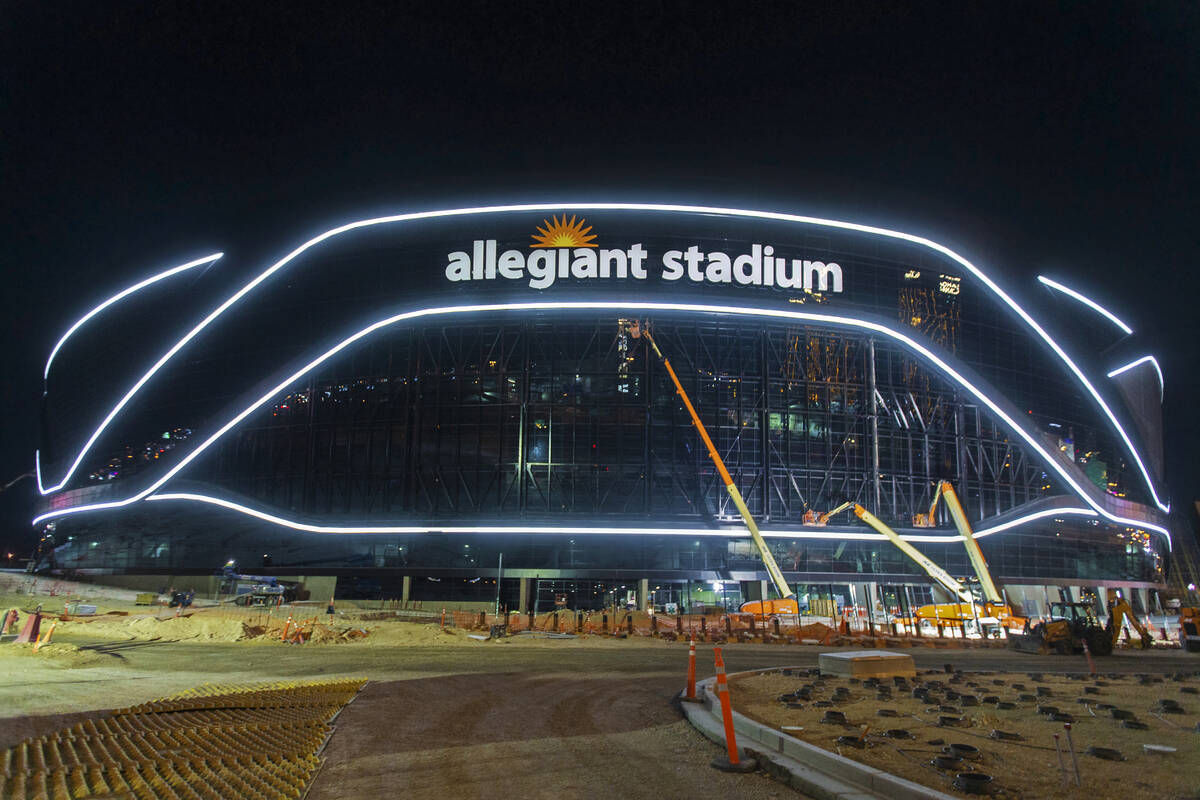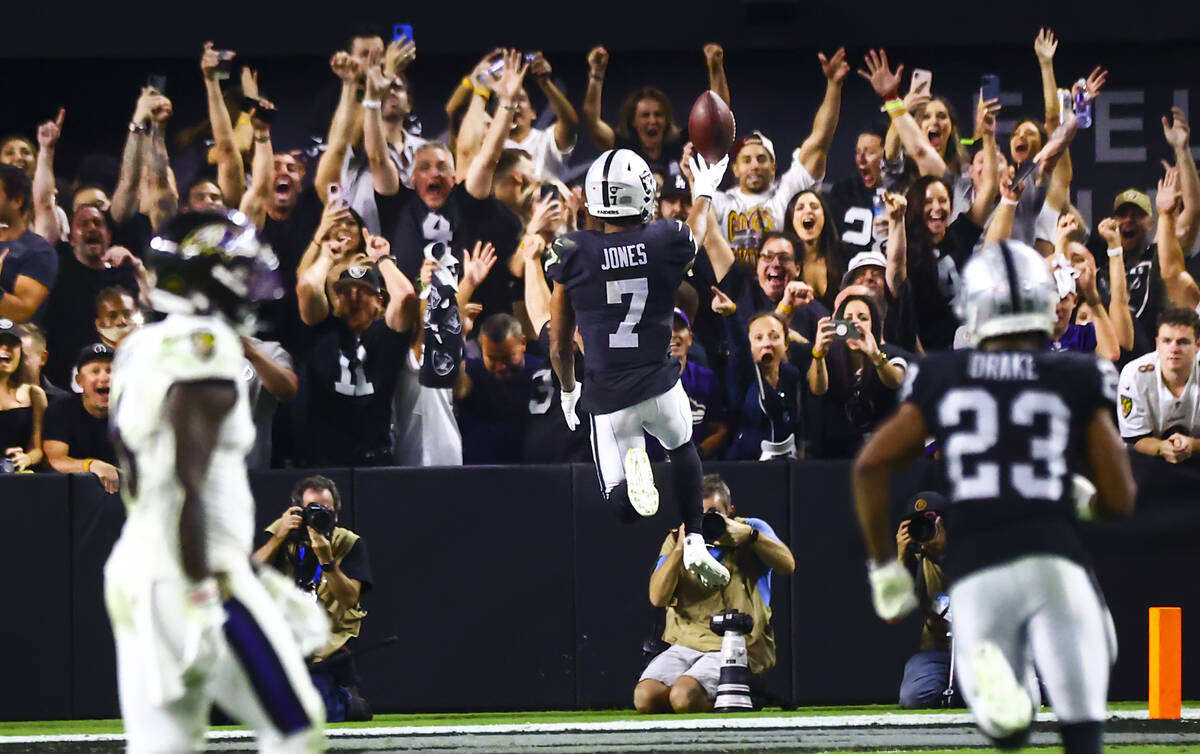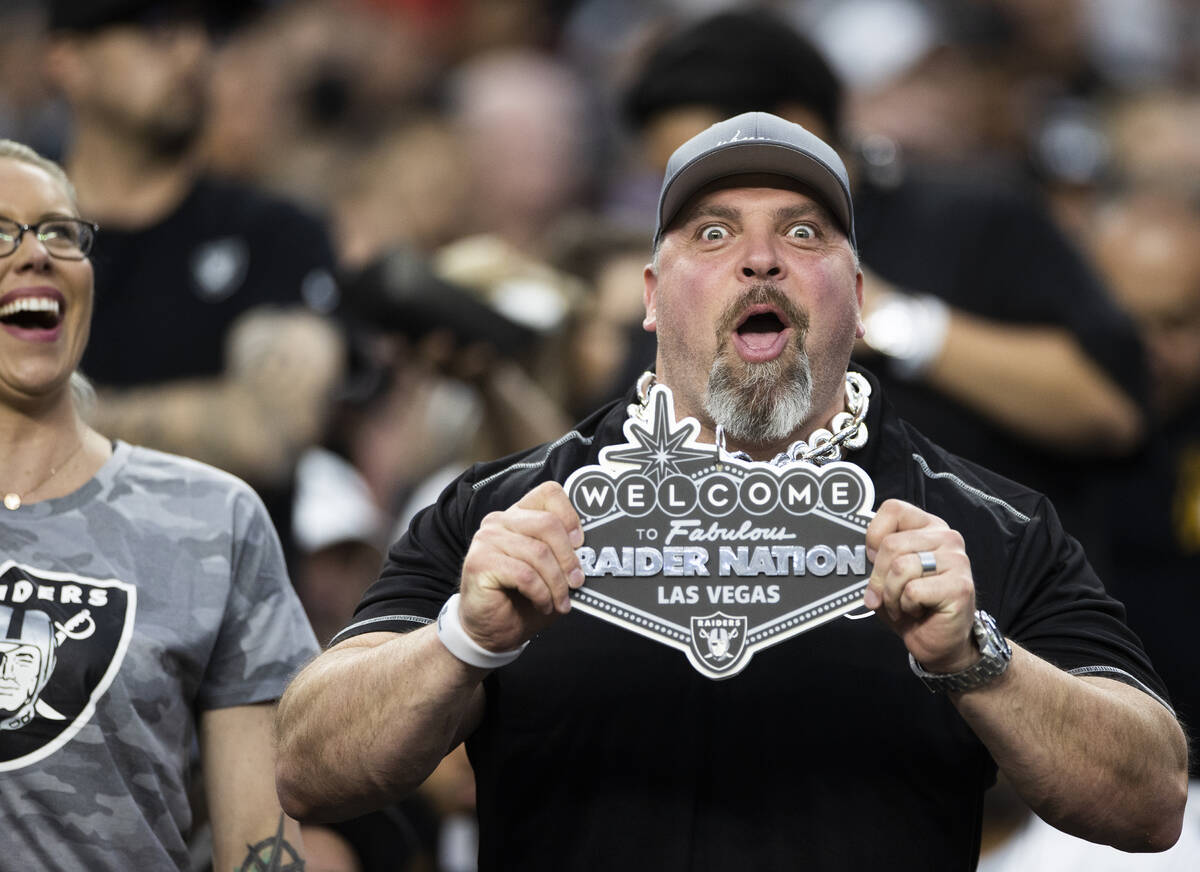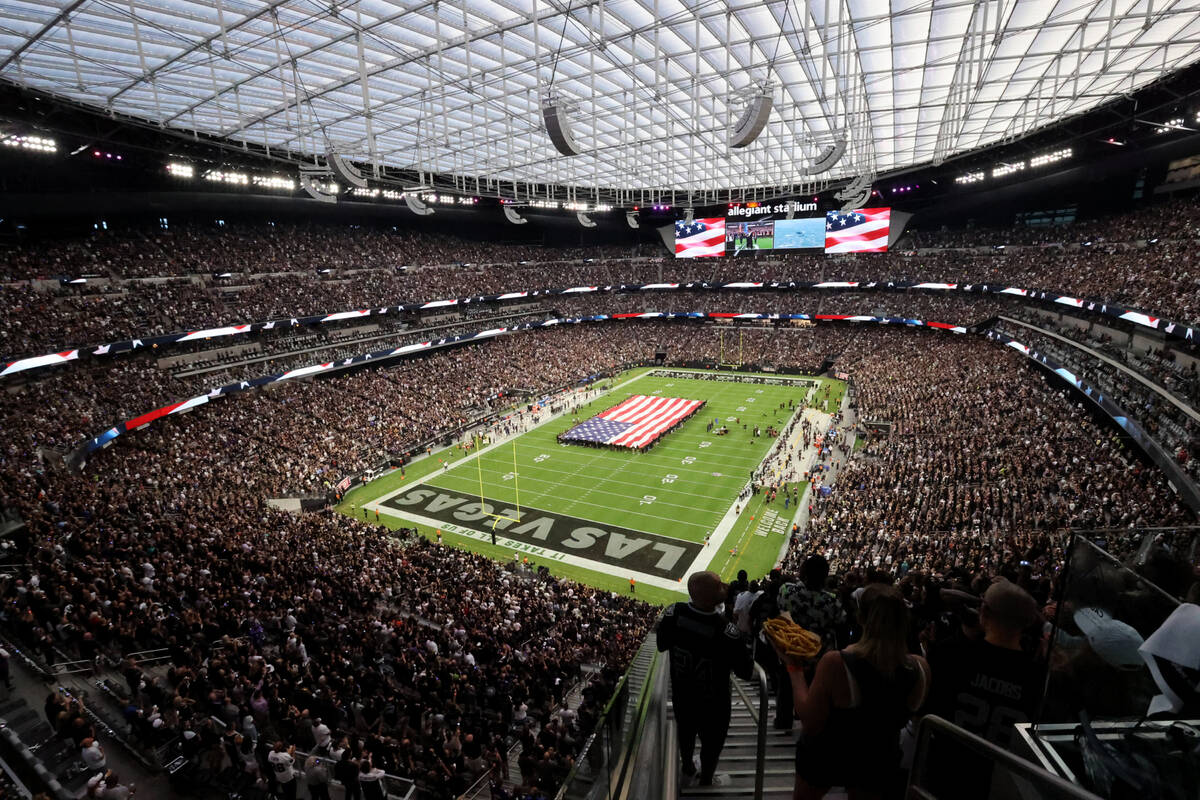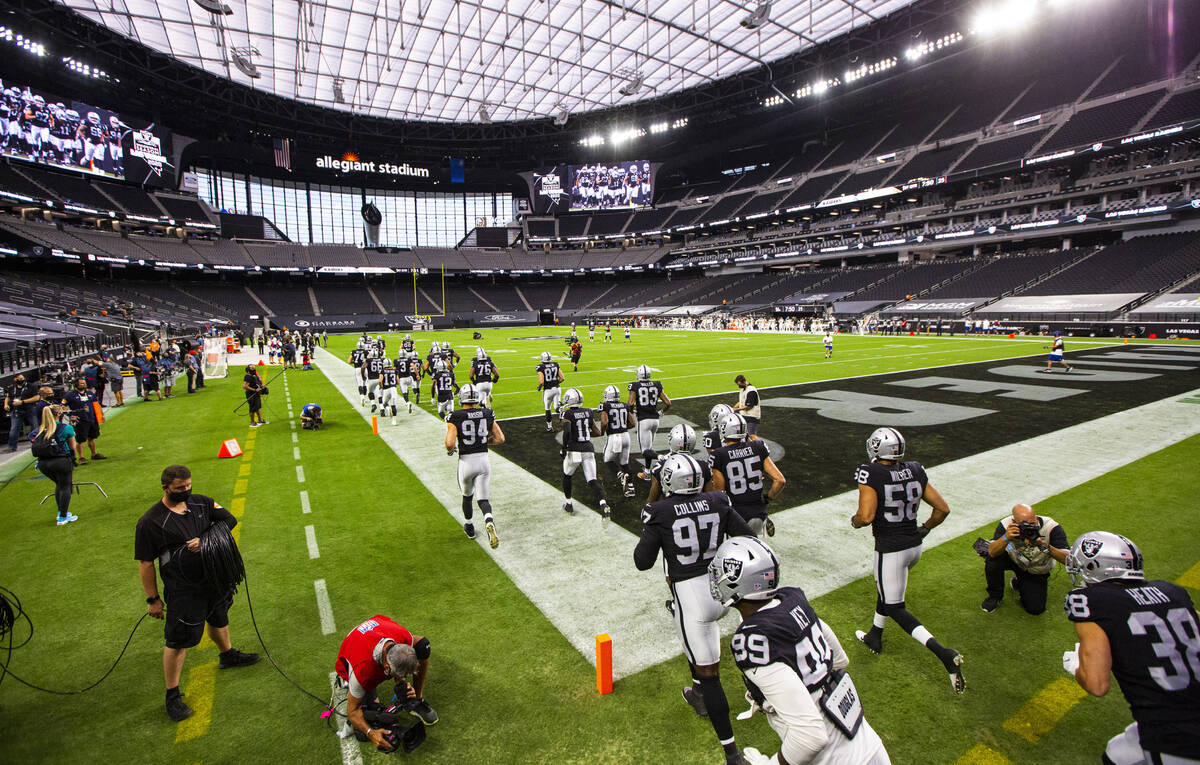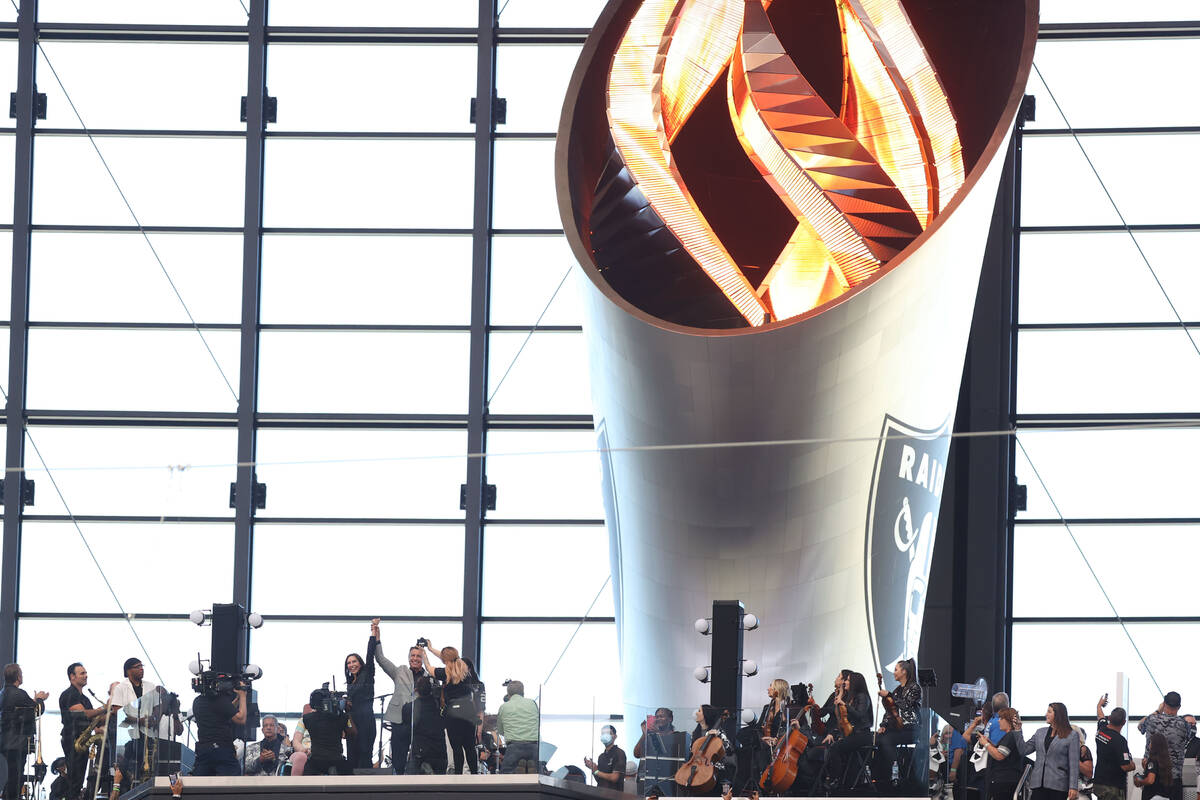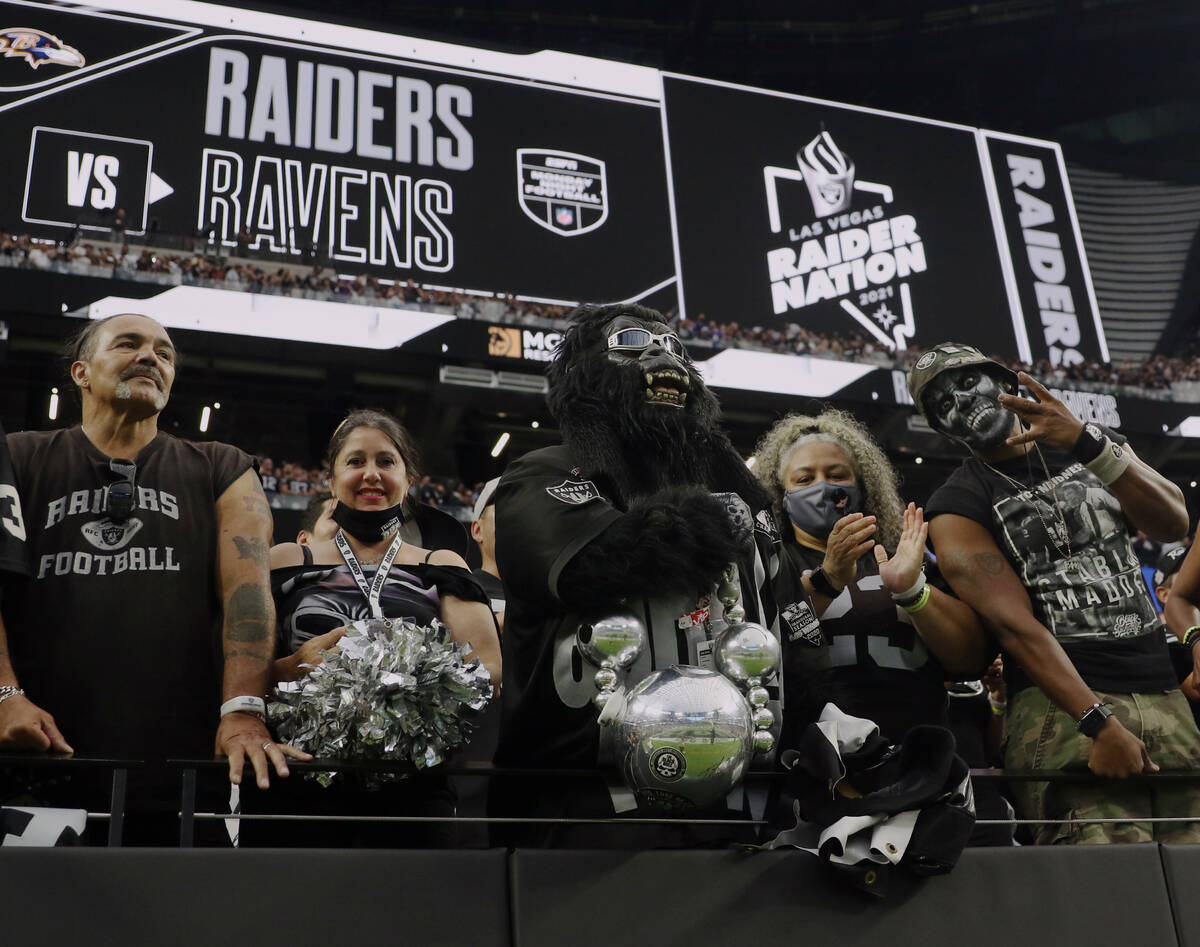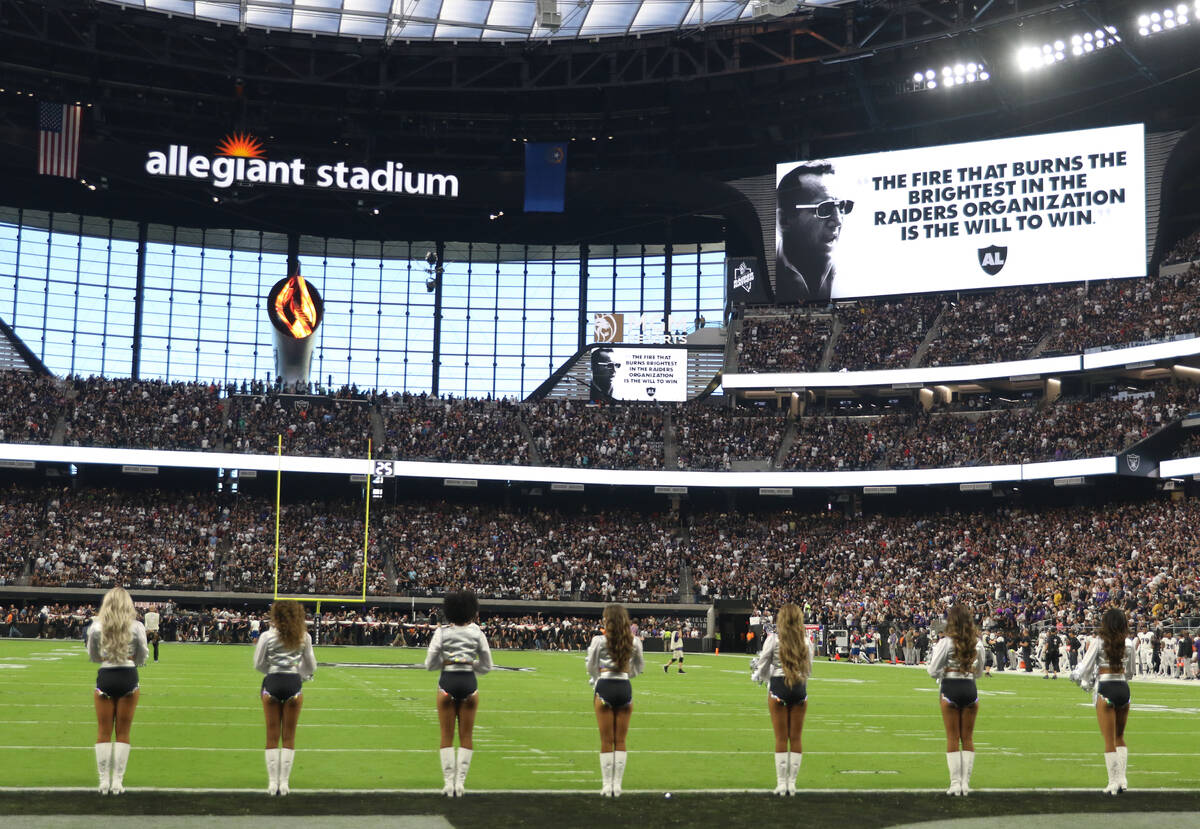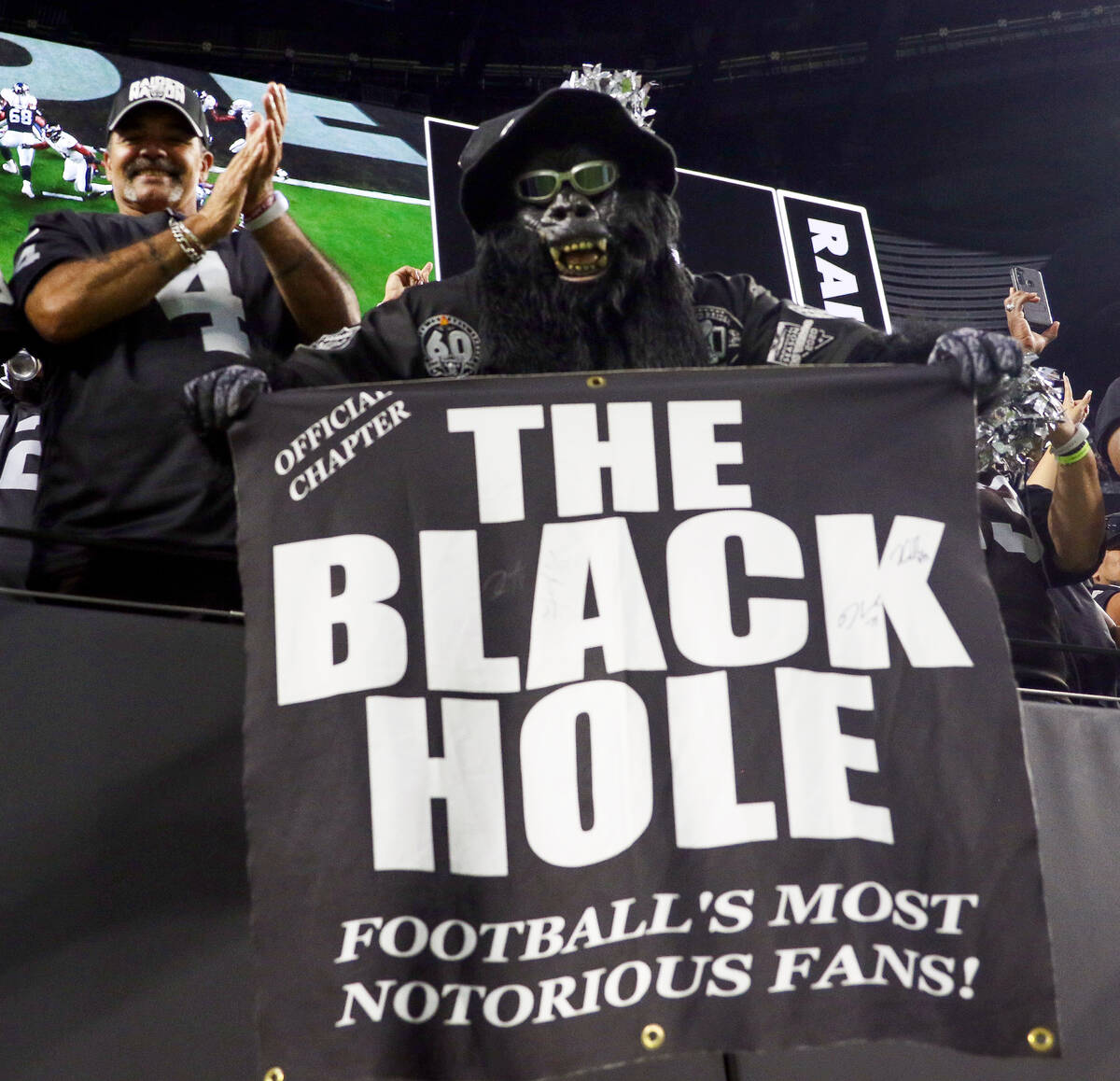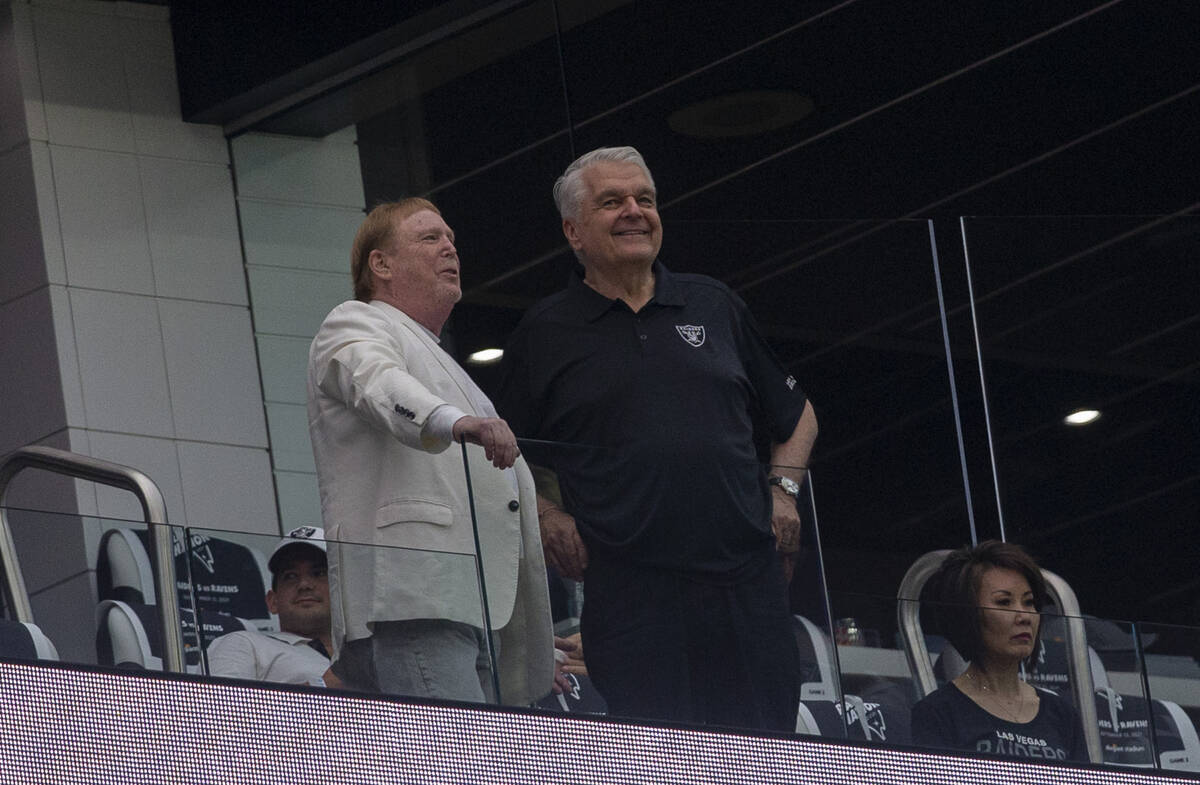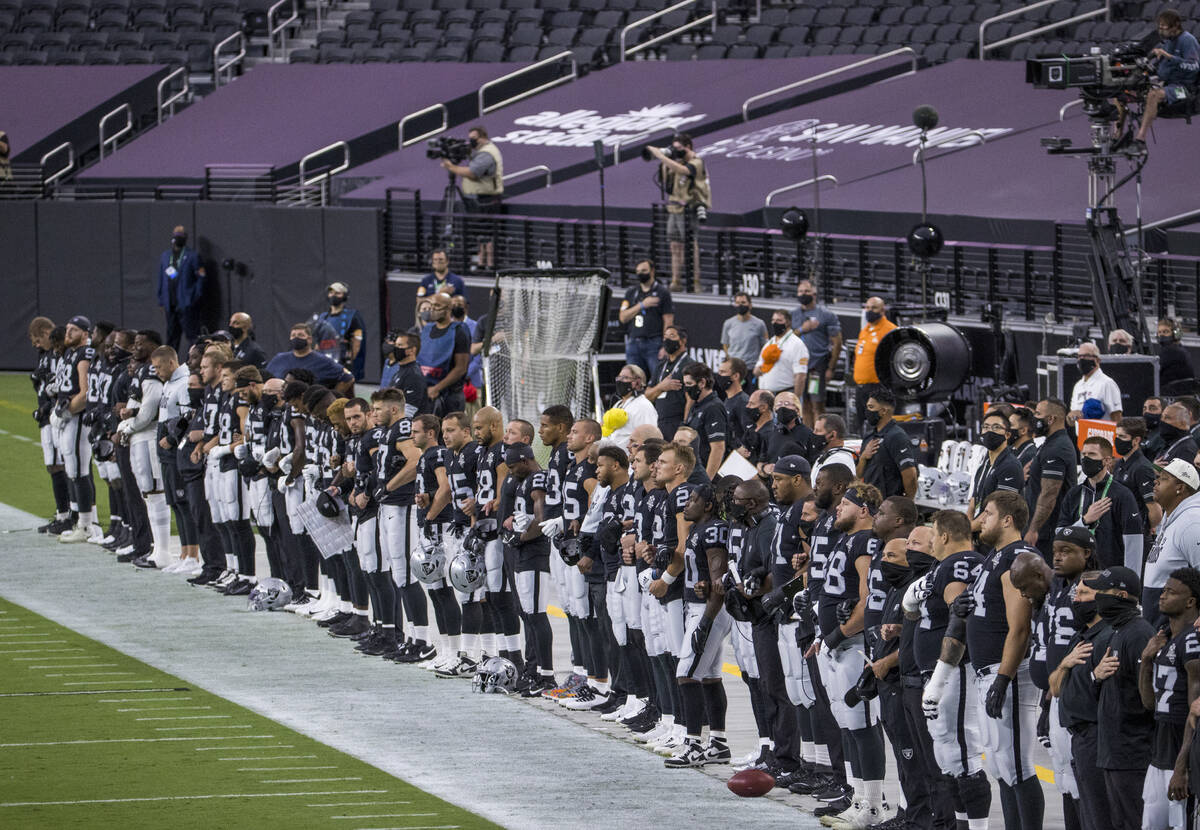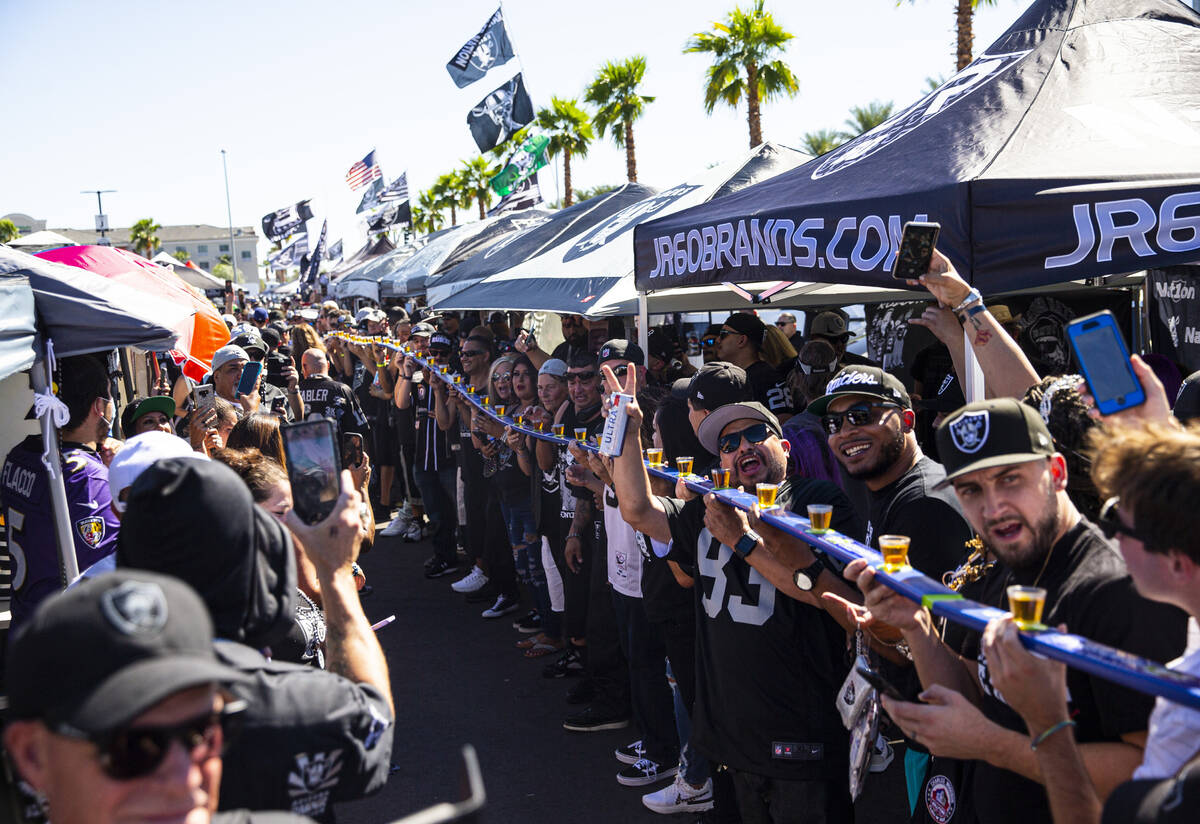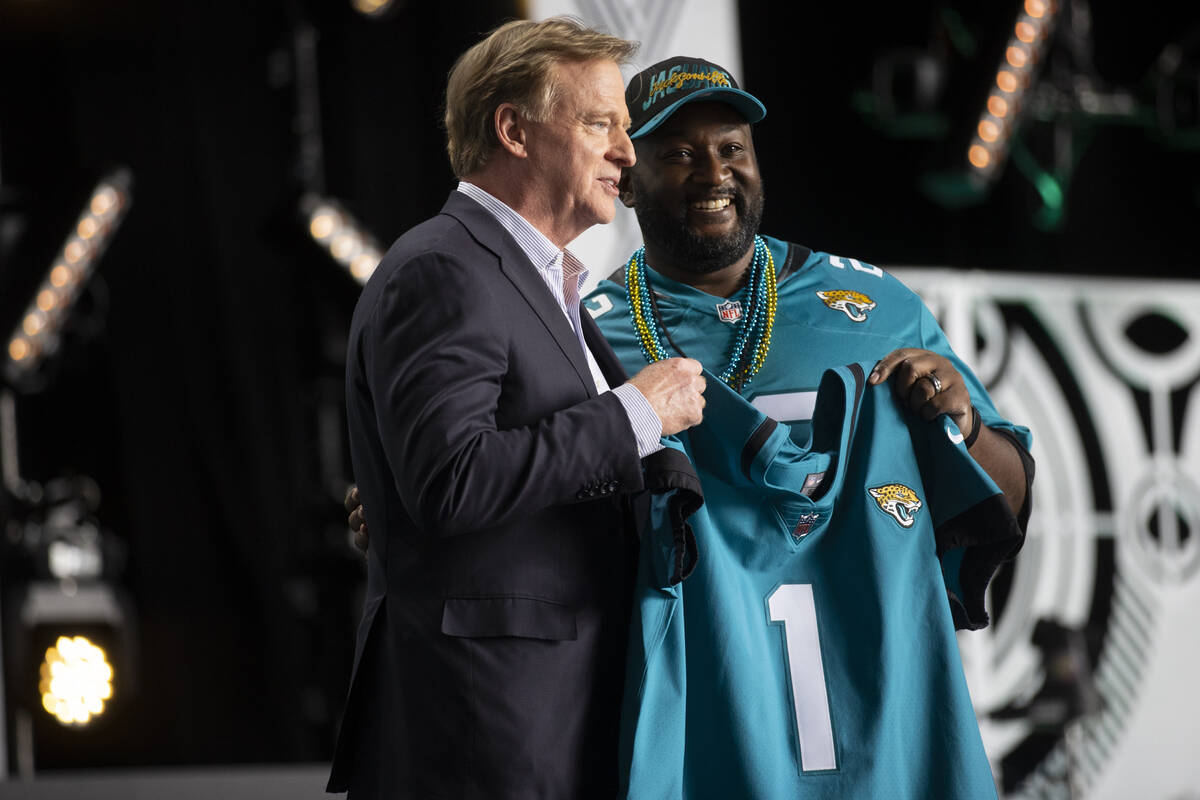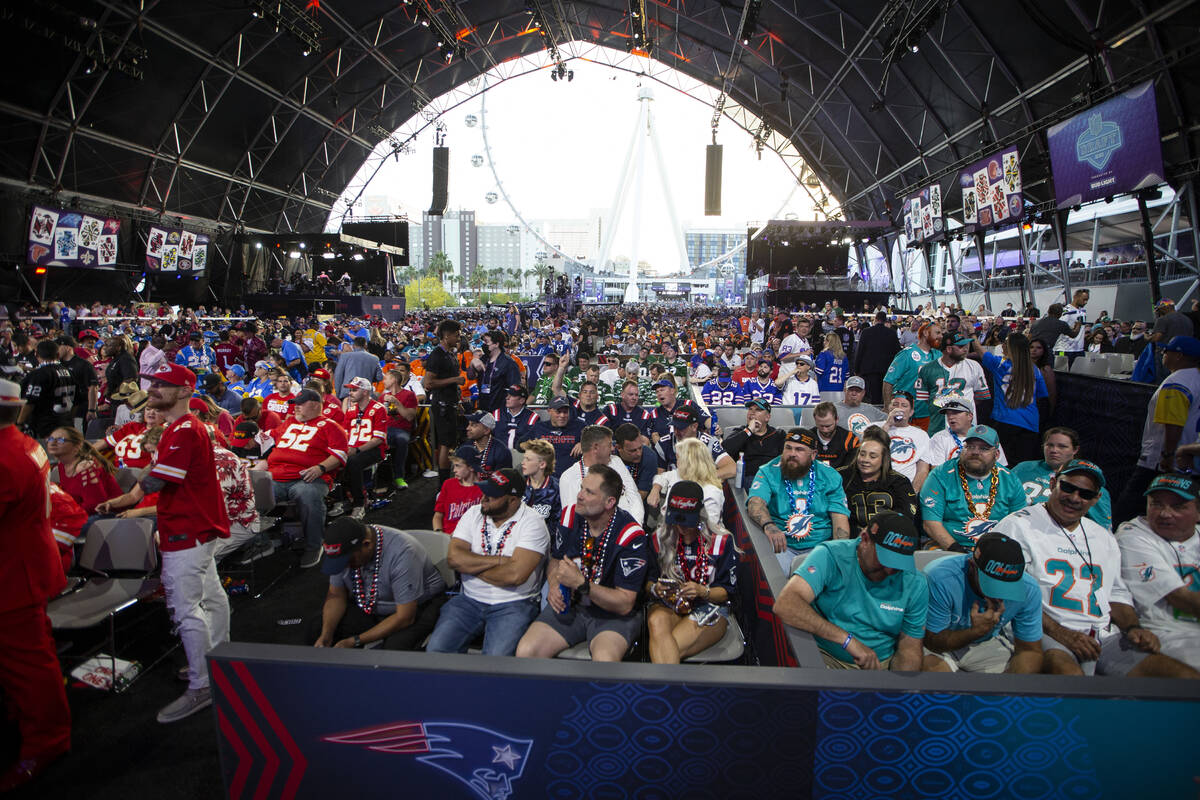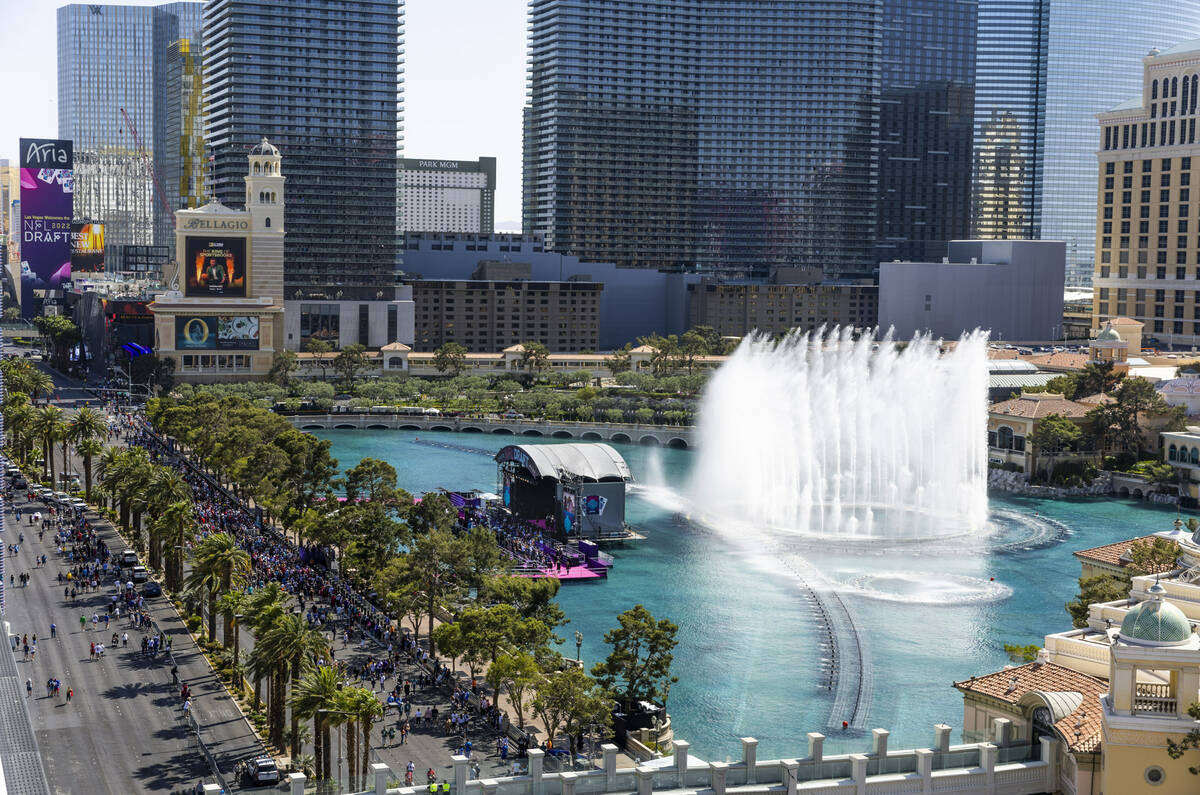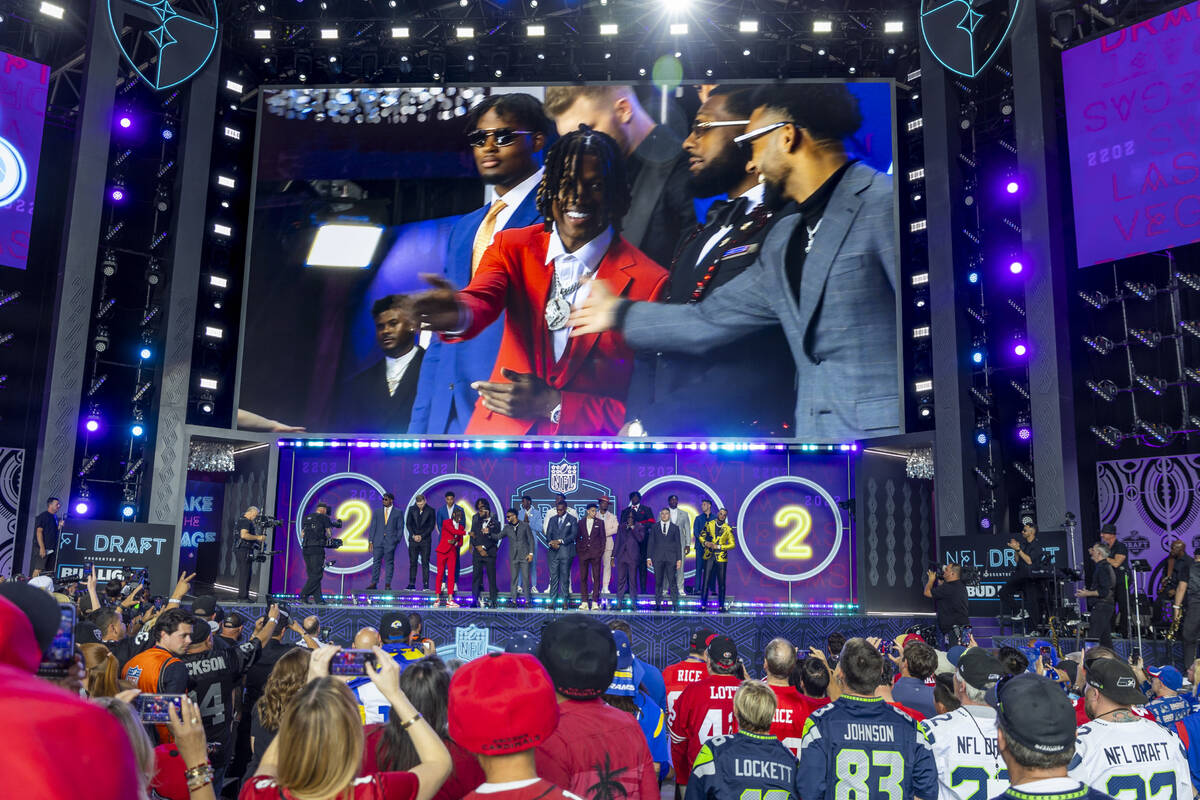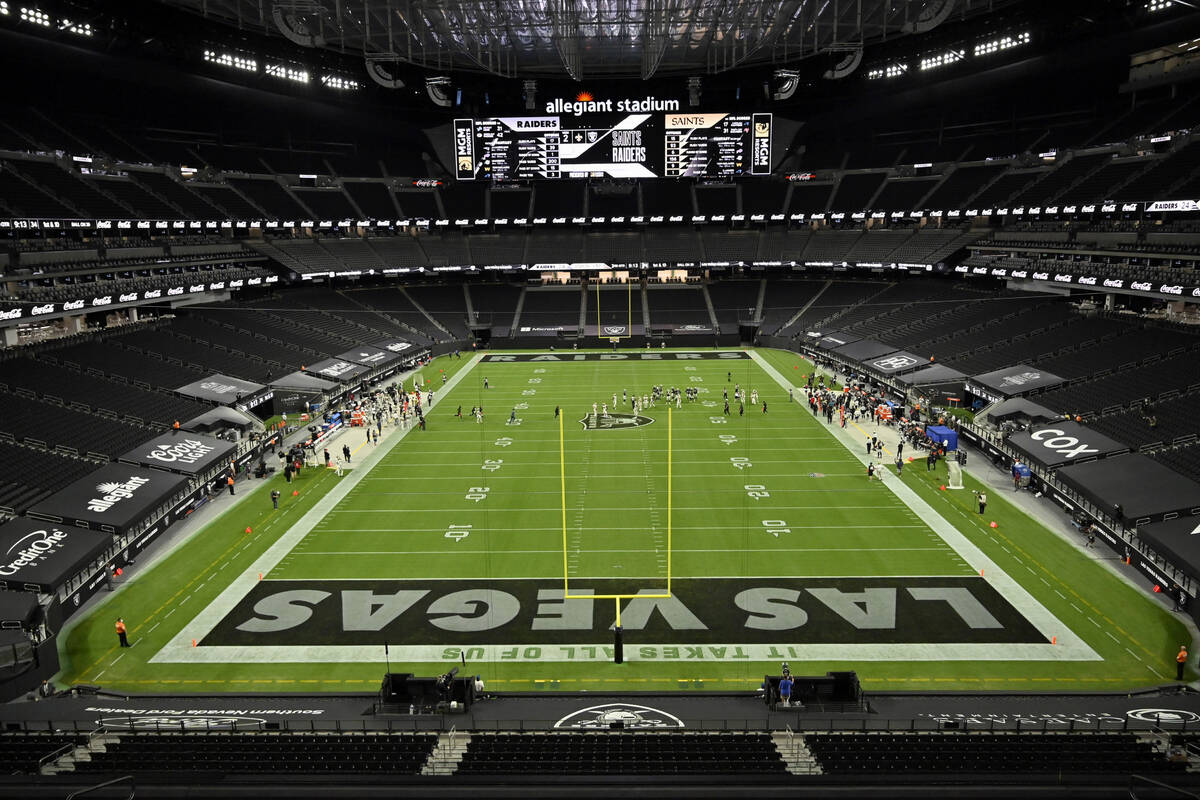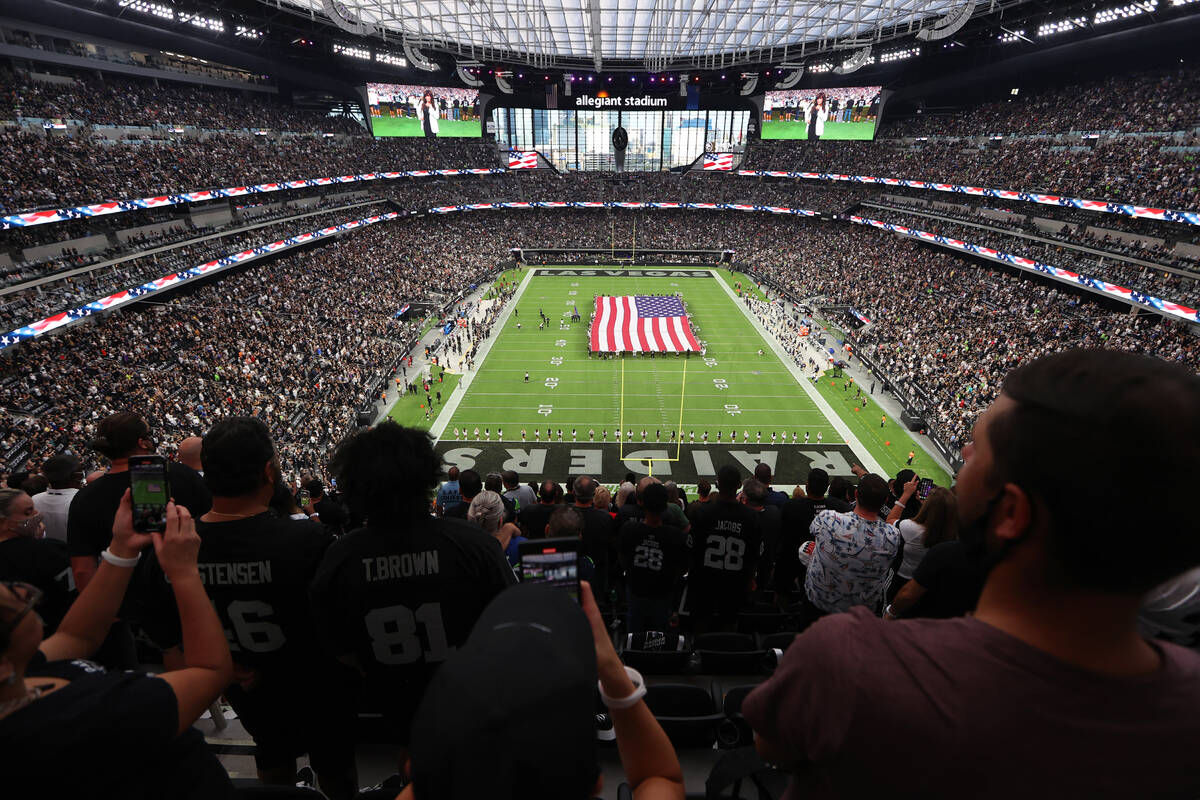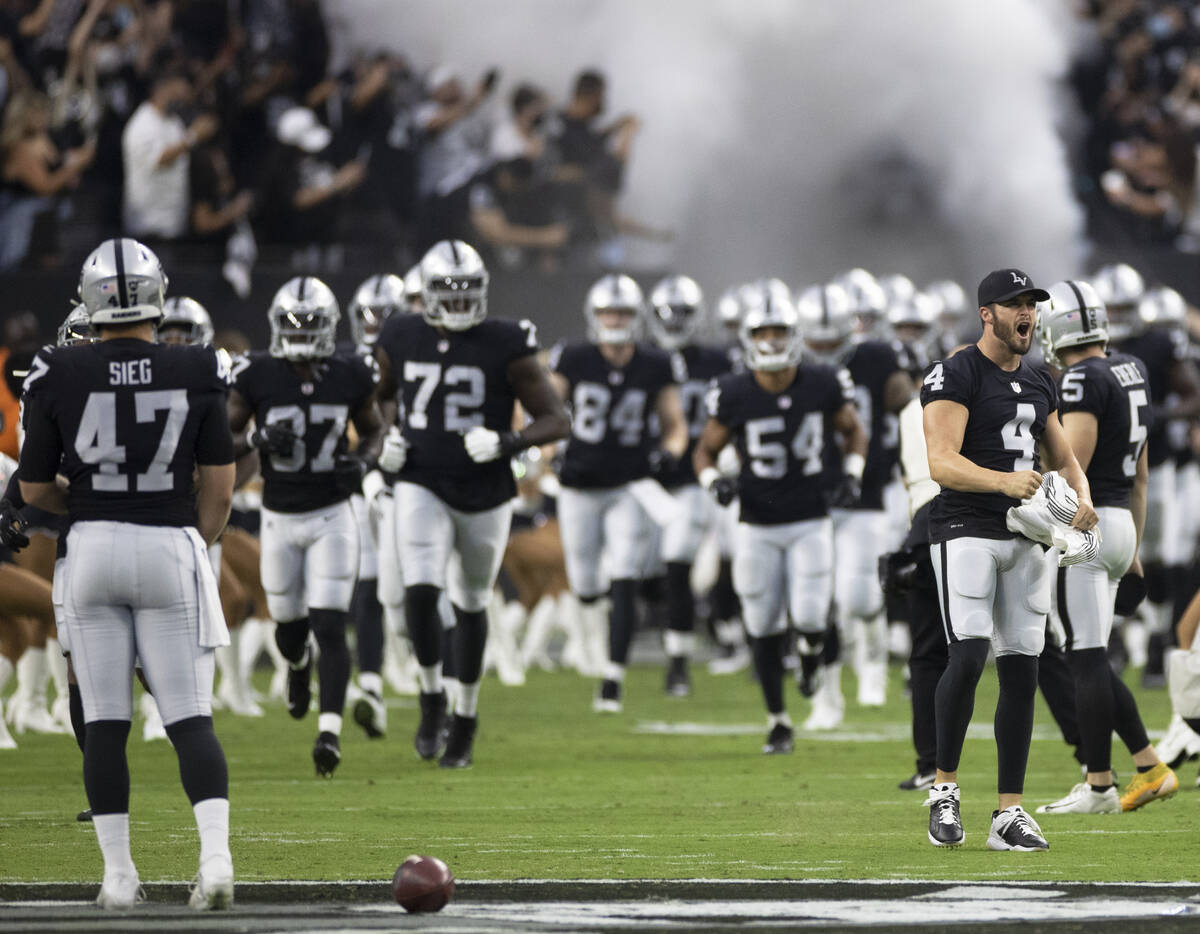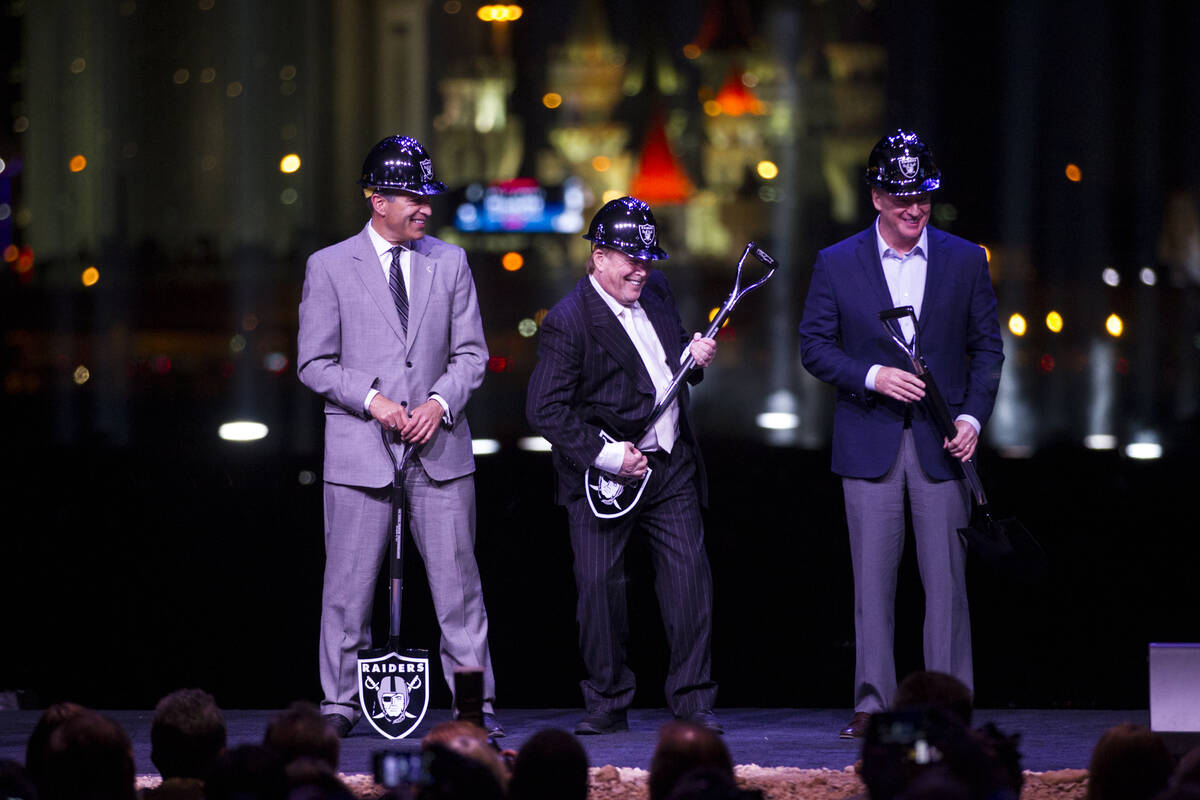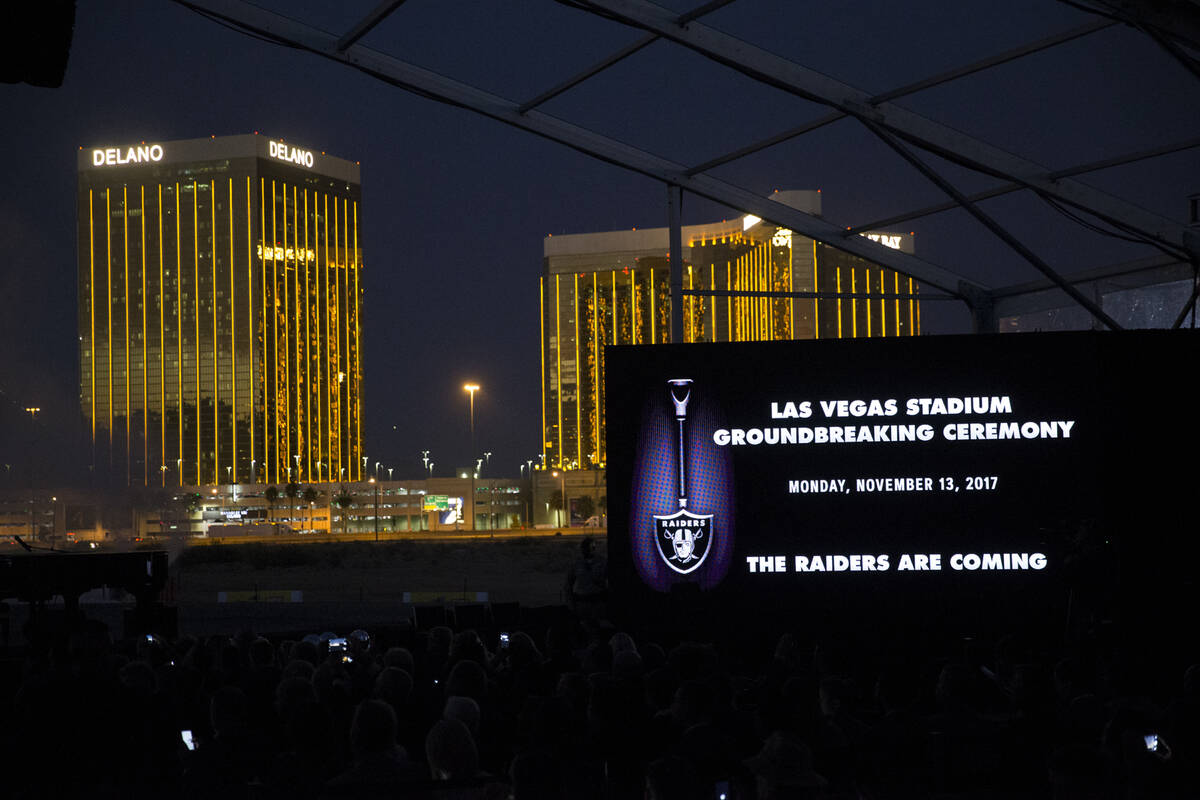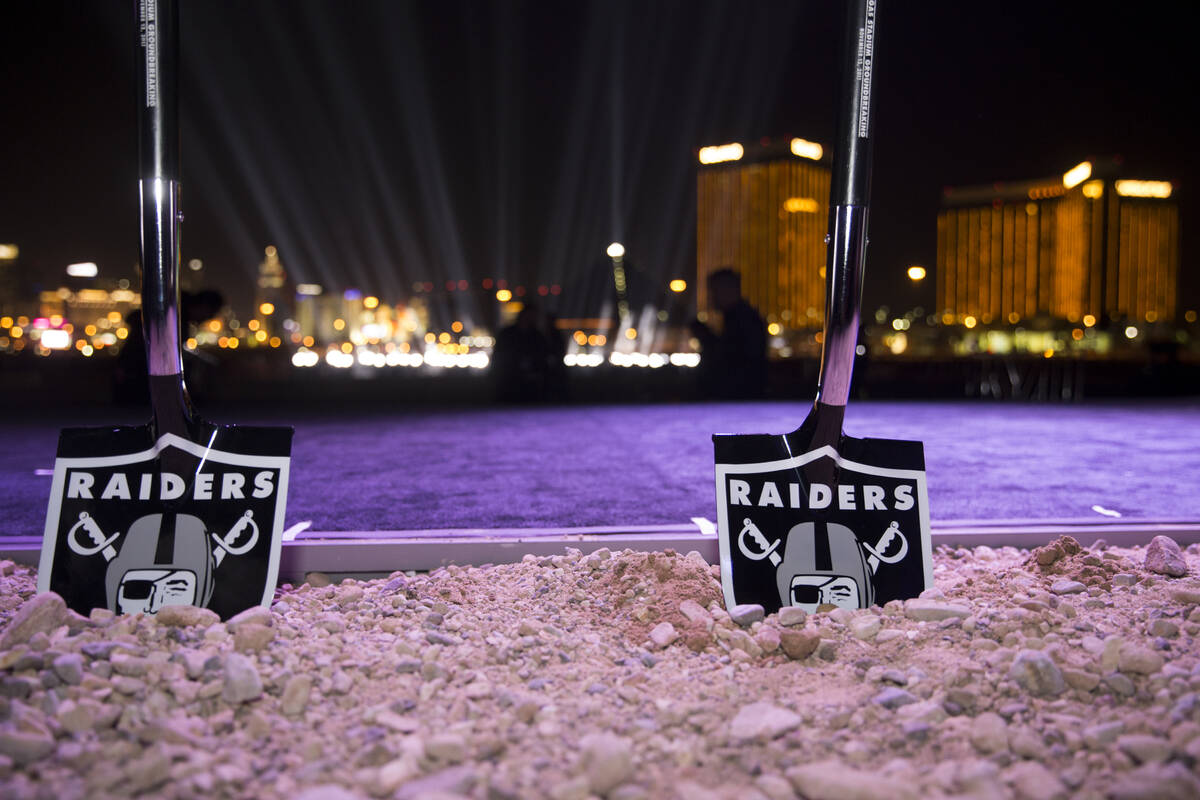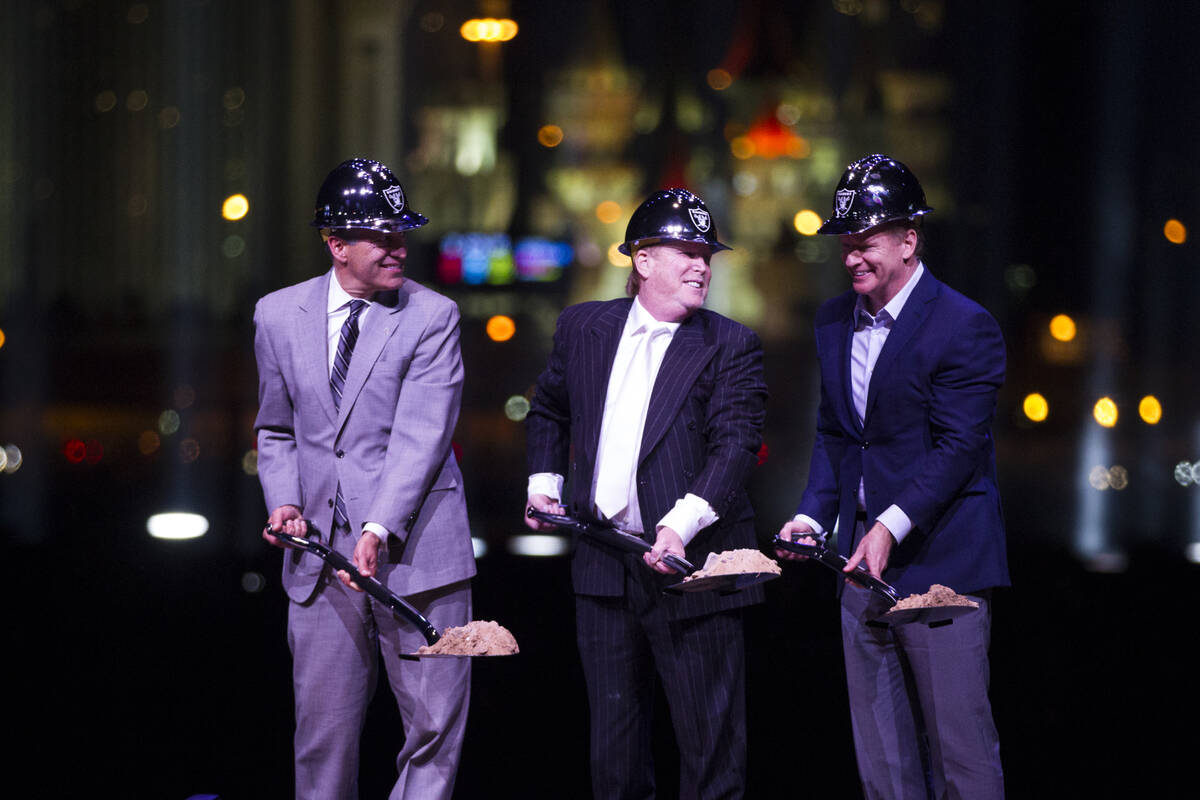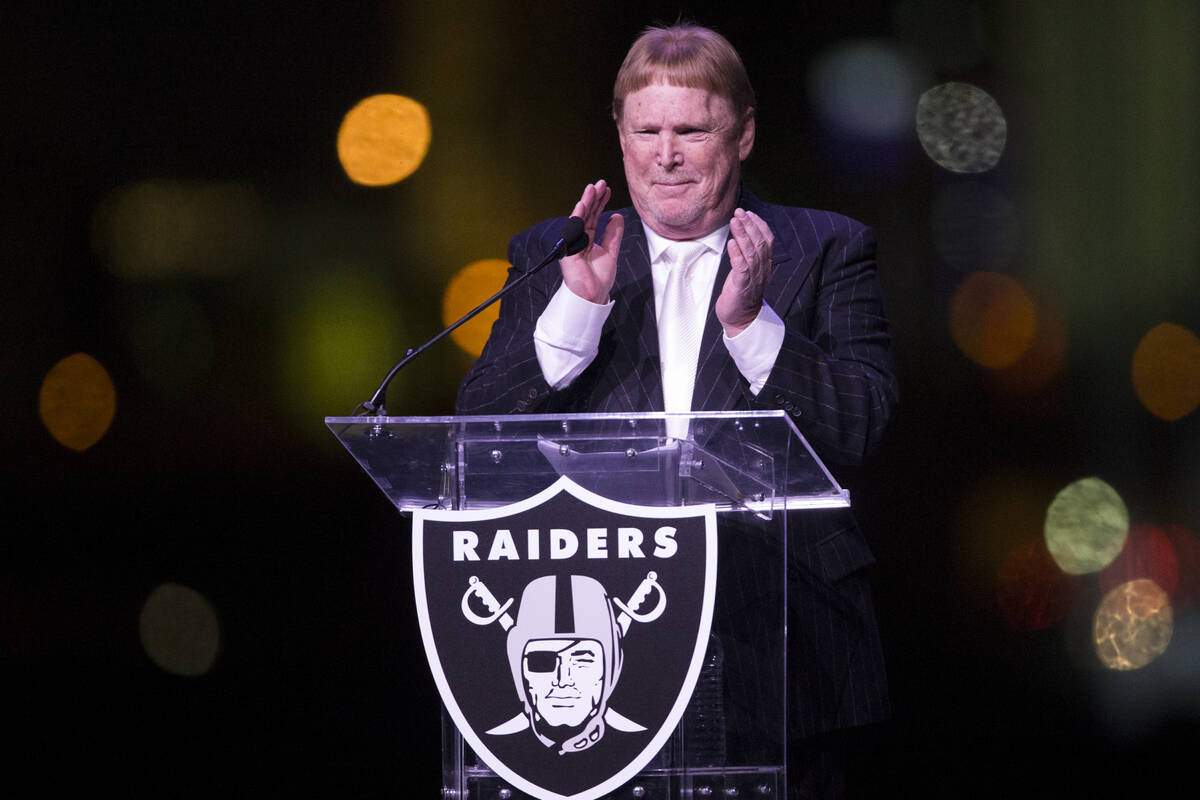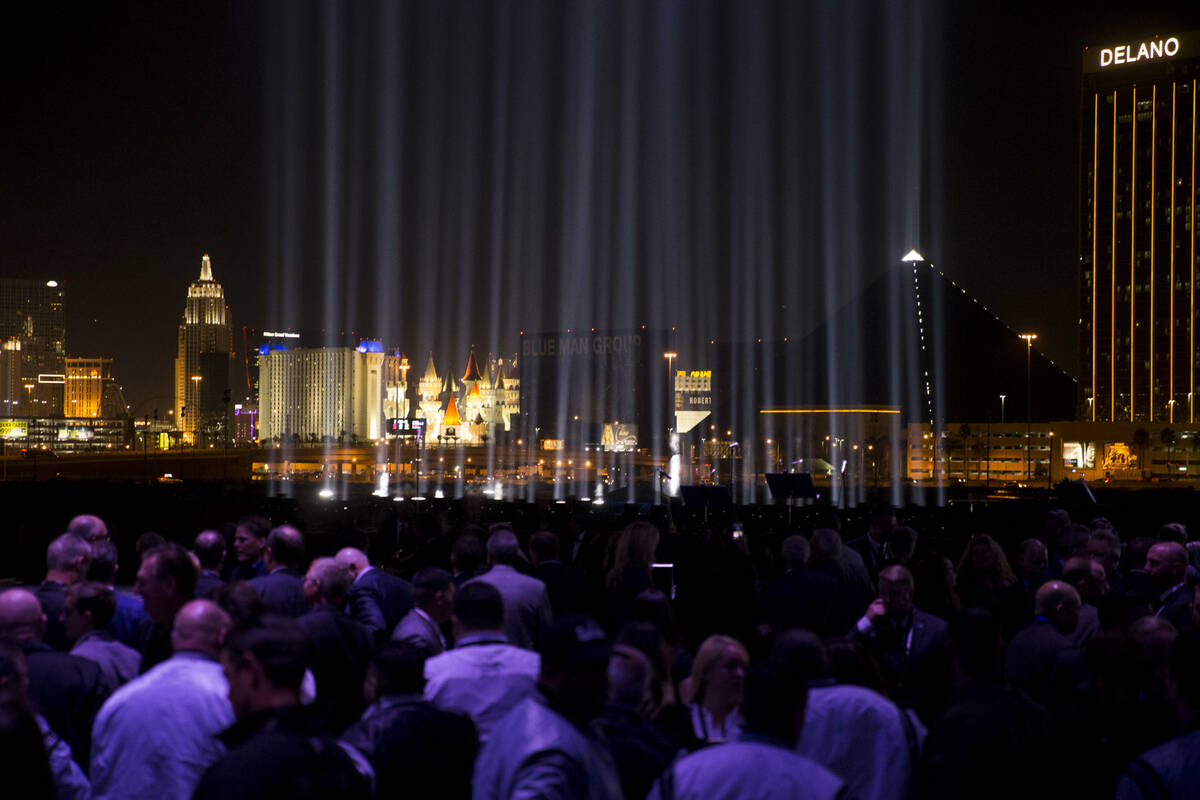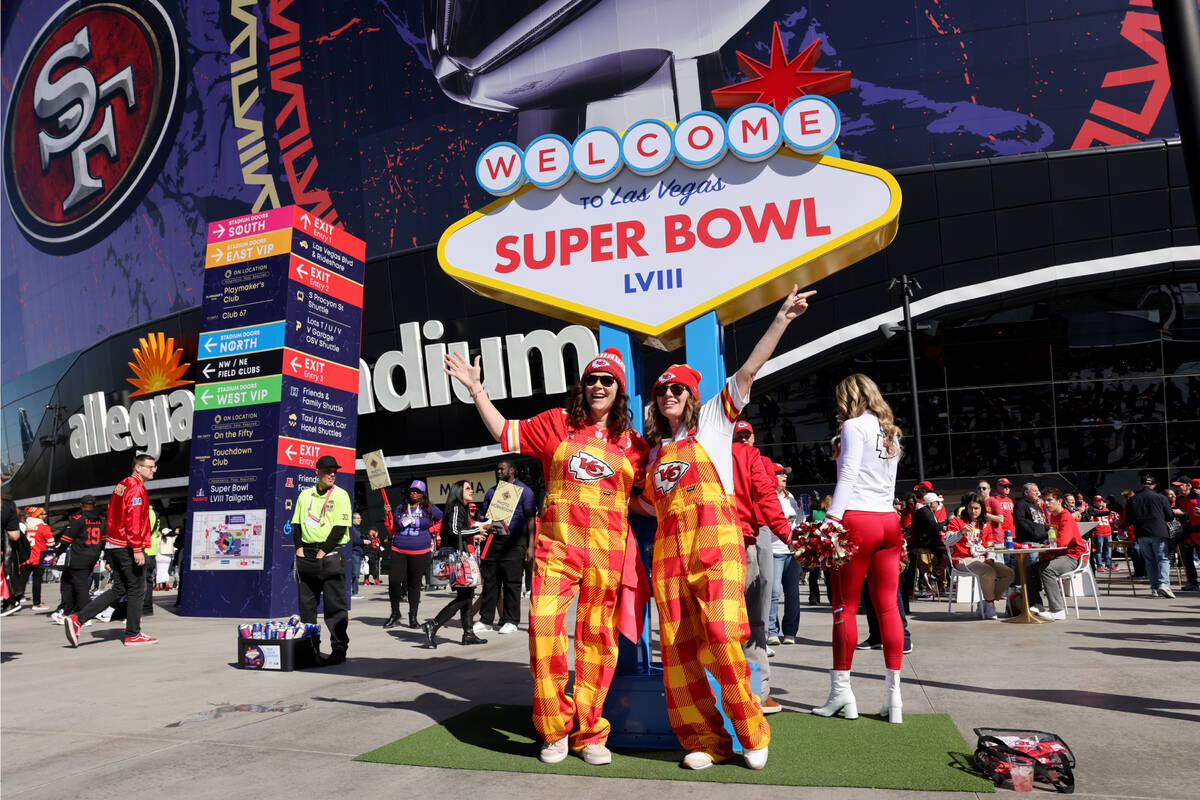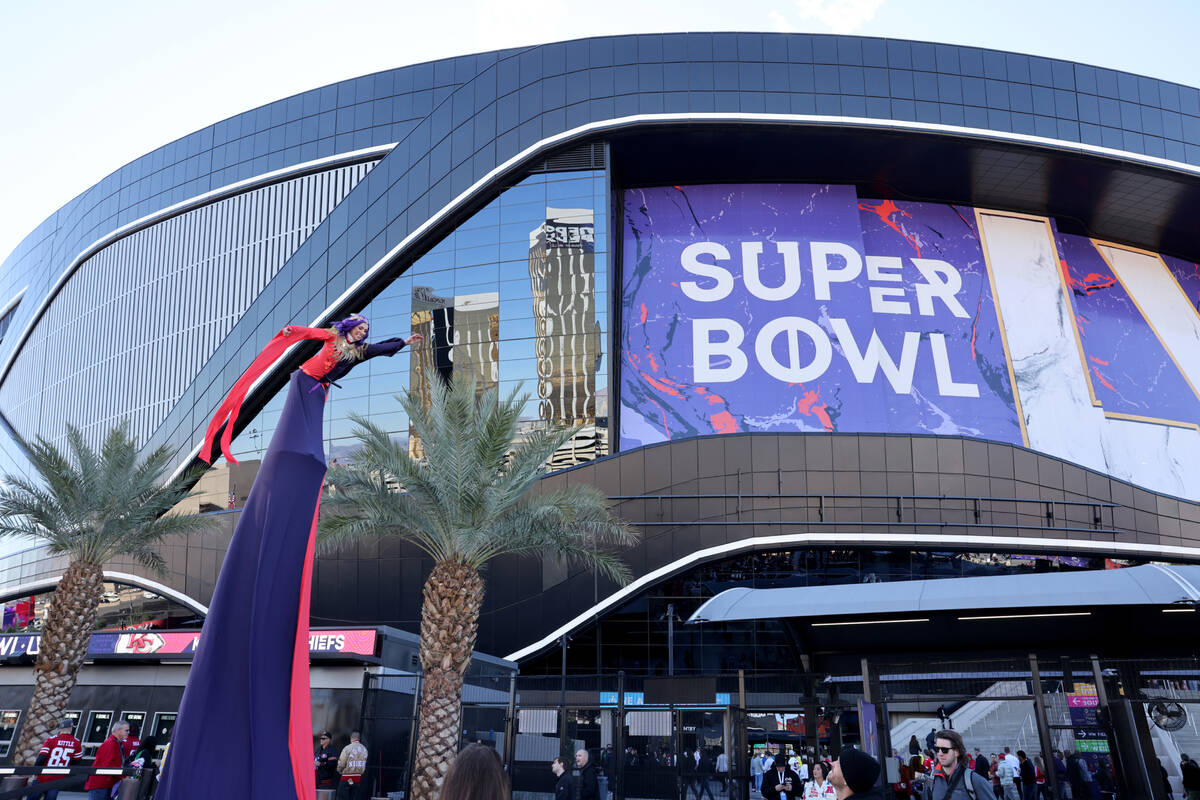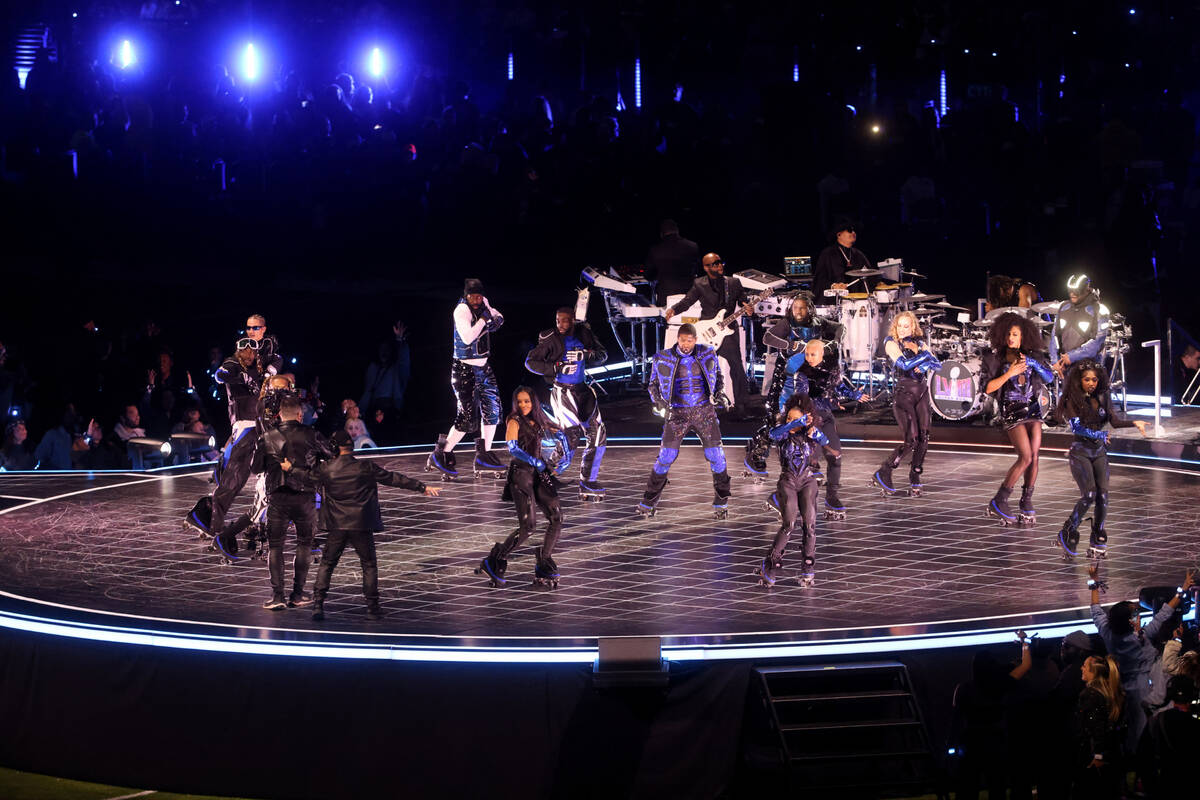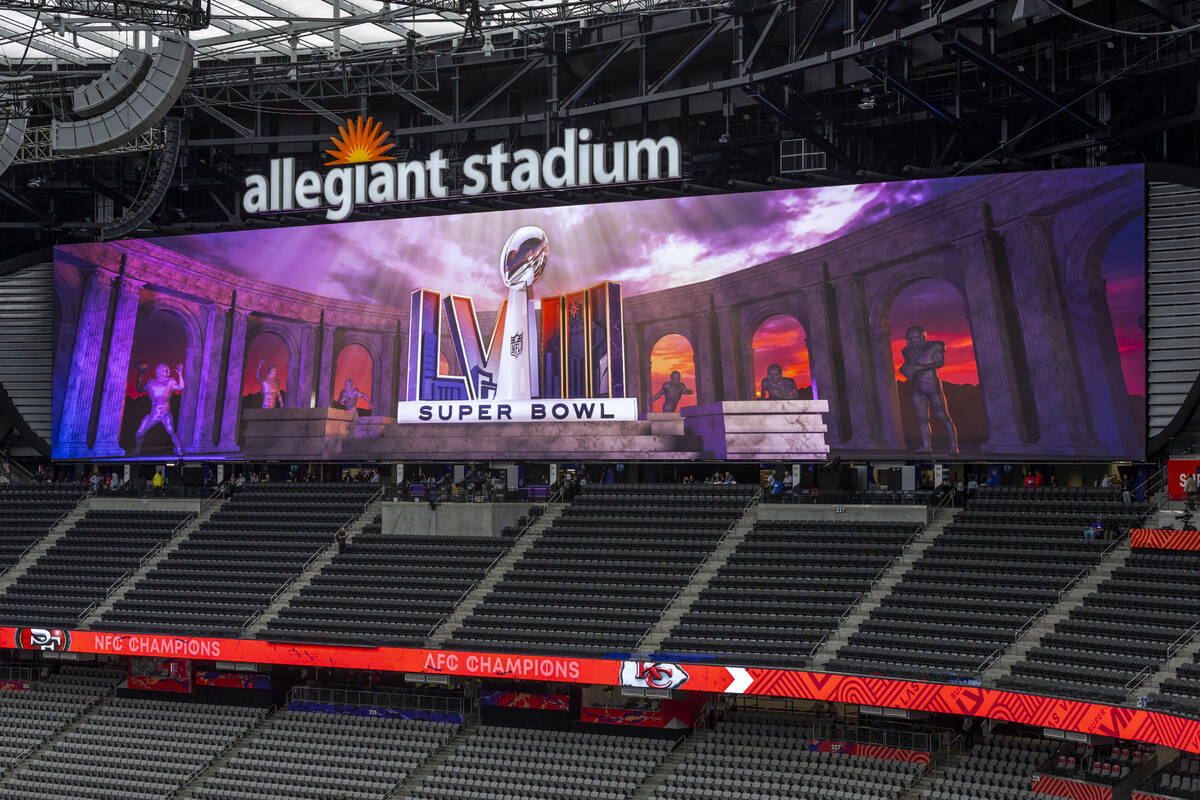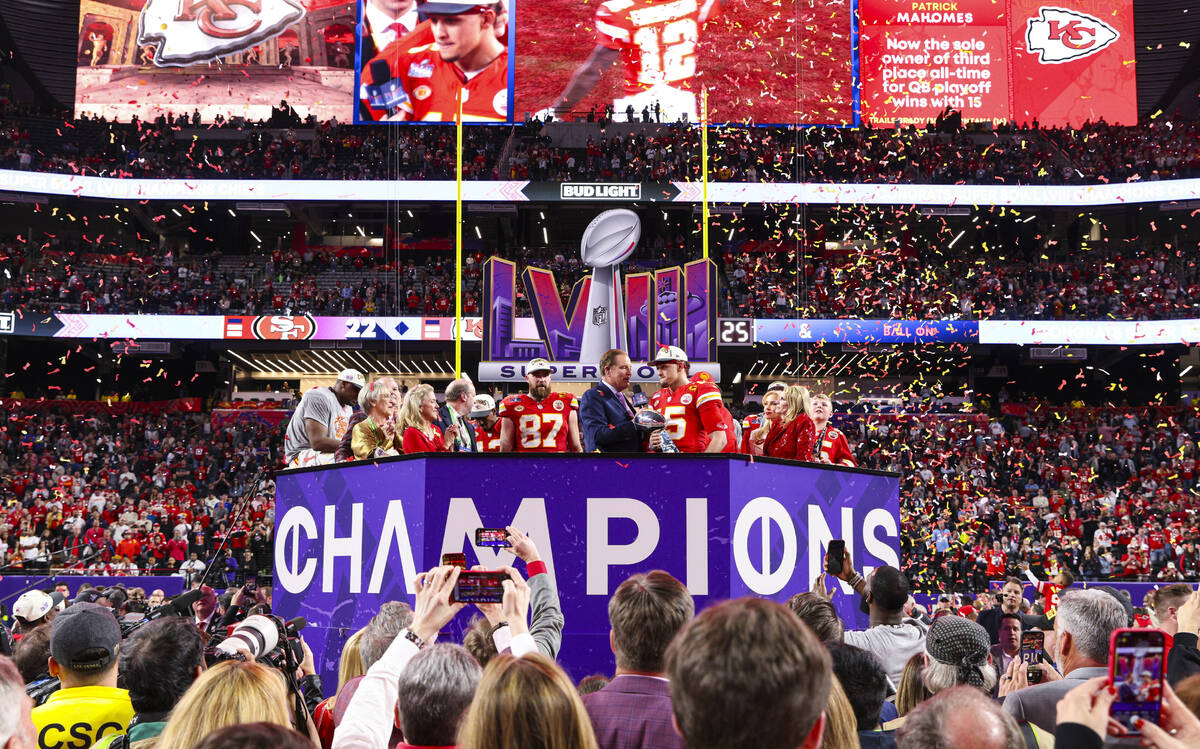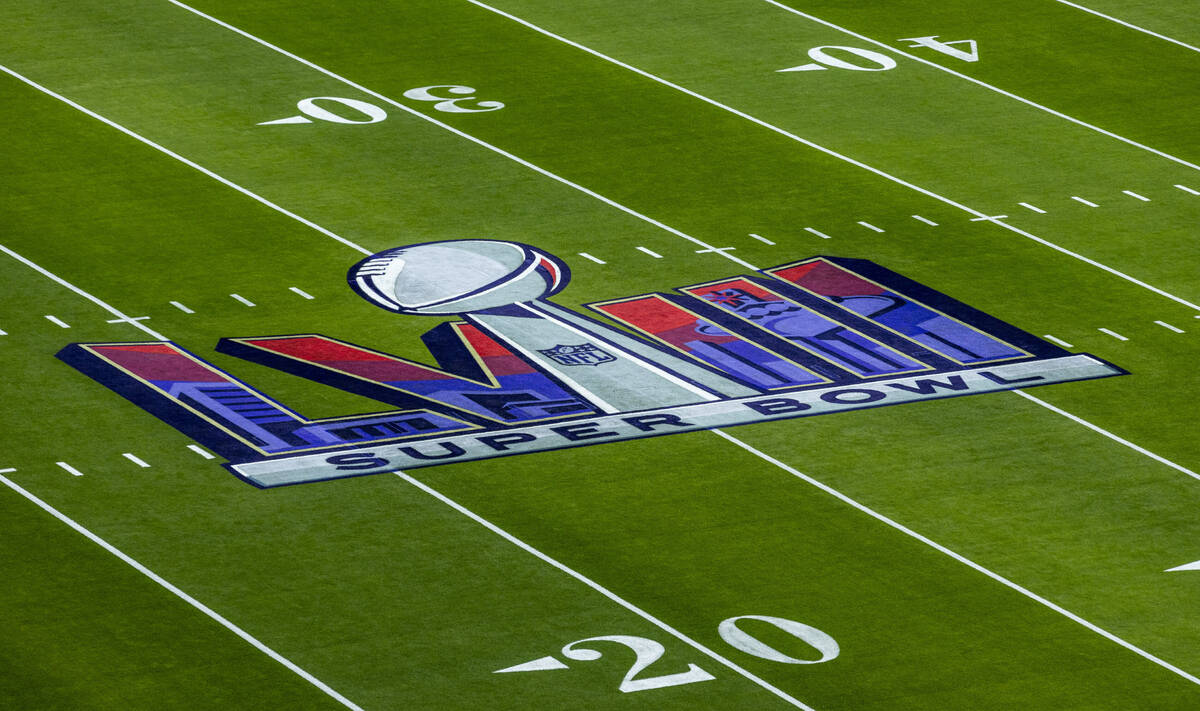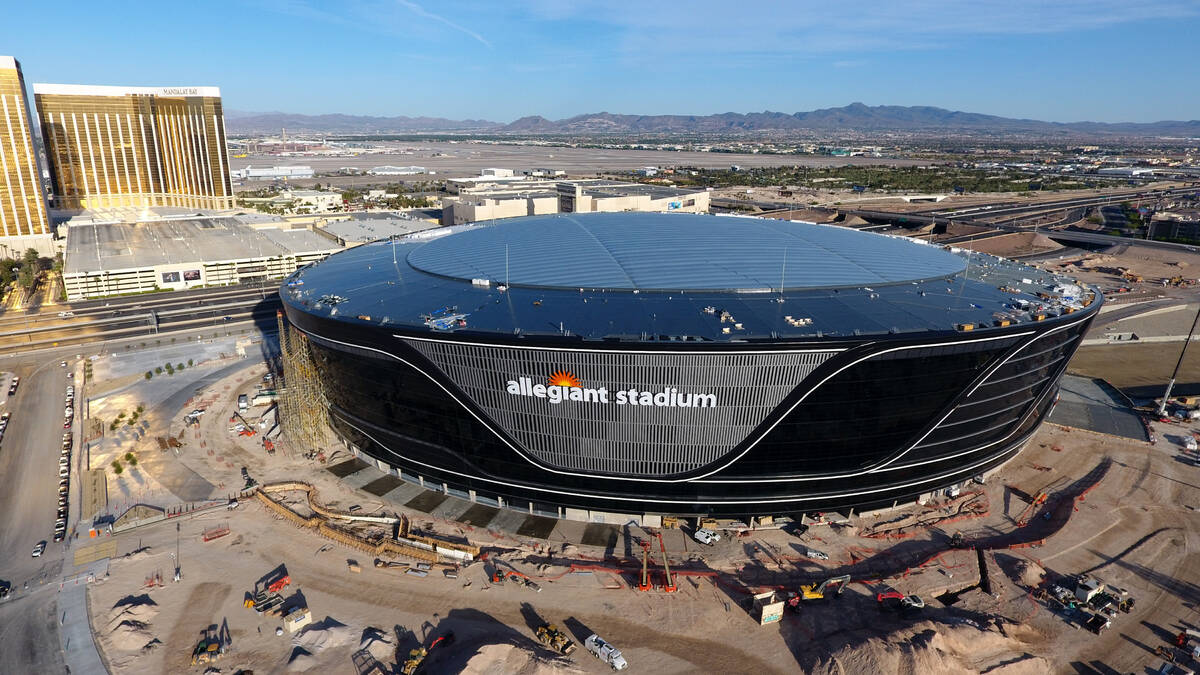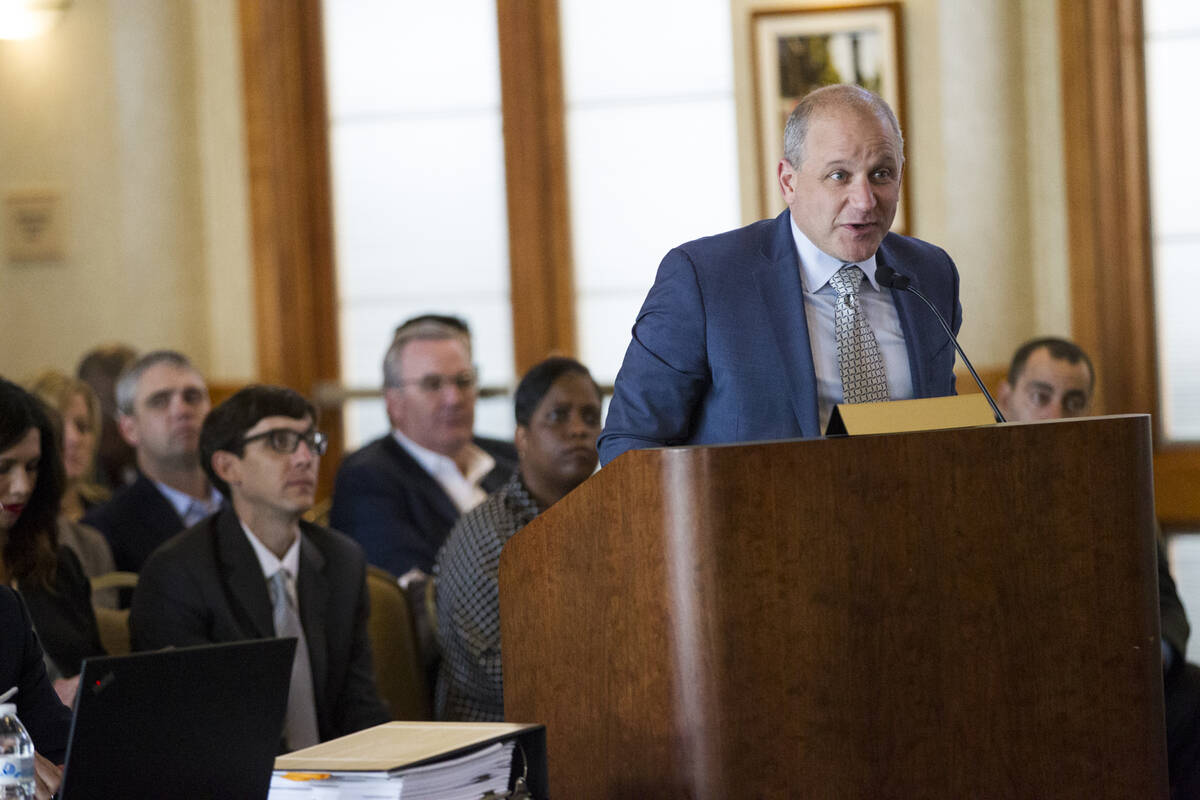5 years later, Raiders in Las Vegas ‘a home run for the NFL’
As the Raiders celebrate their five-year anniversary in Las Vegas, it’s safe to say the move has been a rousing success for the franchise, the NFL and Southern Nevada.
The idea to relocate from Oakland, California, was conceived almost 10 years ago, when Raiders owner Mark Davis and the late Sheldon Adelson began working together on a plan to build a state-of-the art stadium that they thought would transform Las Vegas into a preeminent sports and entertainment hub.
Now, a city once considered too taboo and too small to be the home for an NFL franchise has emerged as one of the league’s most prominent markets.
“Vegas has been a home run for the NFL,” Stephen Jones, the Dallas Cowboys’ chief operating officer and co-owner, said recently at the league’s spring meetings. “It’s nothing but pluses.”
One could even say it has been a grand slam. Within four years of the Raiders’ move, Las Vegas and Allegiant Stadium have hosted a Super Bowl, an NFL draft and two Pro Bowls — the top three events on the league’s yearly calendar.
Super Bowl 58, played Feb. 11, 2024, was so well-received that the NFL wants to return for a second one, perhaps as soon as 2029. The game, in which the Kansas City Chiefs defeated the San Francisco 49ers in overtime for their second straight championship, was the most-watched program in American TV history.
The backdrop of the Strip provided worldwide invaluable advertising for the city.
“I’m sure we’ll be back,” NFL commissioner Roger Goodell said at the spring meetings.
An announcement could come this year.
The franchise’s value also has soared since it changed addresses in 2020. One year before NFL owners approved the move to Las Vegas, Forbes’ valuation for the franchise was $1.8 billion, ranking 31st in the NFL. Last year, the Raiders ranked seventh with a valuation of $6.7 billion.
Ticket brokers have thrived, too. On the secondary market, Raiders tickets have been among the hottest-selling in the NFL the past five years, as fans plan weekend trips to the entertainment capital of the world.
The rest of the sports and entertainment world is also tapping in. Allegiant Stadium and Las Vegas recently produced the most successful WrestleMania weekend of all time, and there is talk of professional wrestling’s signature event returning next year.
College football will play its national championship game in January 2027 at Allegiant Stadium. The NCAA men’s basketball Final Four will be played in April 2028 at Allegiant.
It all has created a financial windfall for the valley.
According to Jeremy Aguero of Applied Analysis, 5.4 million people have attended 134 events at Allegiant Stadium since the venue opened to fans in 2021 through the end of 2024. Half of those attendees were from out of town, of which 2.3 million were visitors who traveled to Las Vegas primarily to attend the stadium event. Local residents make up the other 2.7 million attendees.
The incremental visitors spent an estimated $3.4 billion on rooms, food, beverages, entertainment and other tourism-related activities. When the impact of tourism-related vendors and tourism employees’ spending in the community are combined, the economic impact of Allegiant Stadium totals $5.7 billion.
Part of the pledge from state and local leaders upon approving the $750 million in public funding for Allegiant Stadium, which was raised by Clark County bond proceeds and room-tax revenue, was the financial impact the stadium would create.
“This not only exceeds the project’s expectations, but places Allegiant Stadium in the top tier of major event centers in the United States,” Aguero said. “That’s a credit to the fulfilled promises of the Raiders’ organization and the vision of state and local leaders that made it possible.”
As Las Vegas Convention and Visitors Authority CEO Steve Hill said: “It’s been an absolute game changer for this city.”
The seeds of a deal
The NHL’s Golden Knights will forever deserve credit for being the first team to prove Las Vegas could house a major professional sports franchise.
Since first taking the ice in 2017, they have become one of the league’s best teams and one of the hottest tickets in town. The 41 regular-season games they play each season at packed T-Mobile Arena showed that Southern Nevada and its more than 2 million residents could support a professional team.
But Las Vegas always aspired to be a sports and entertainment capital that could attract the biggest events in the world. There was just one hang-up: A stadium large enough to accommodate those events.
“We’d had conversations about building a stadium and hoping someone would see the merits of moving here,” Hill said. “But that didn’t seem like a path that was going to materialize.”
Few could have forecast it, but in early 2016, a door was about to crack open that would alter the landscape and perception of Las Vegas forever.
The Raiders were running out of options after failing in their decades-long quest to build a state-of-the-art stadium in Oakland and in their relocation bid to Los Angeles.
The failed Los Angeles pursuit did not leave Davis empty-handed, though. As part of the process, he proved to the NFL the dysfunction and dead ends he was dealing with in the Bay Area. The league granted Davis permission to relocate as a result. That gave him the right to approach any market with a pledge that the franchise would move there if a stadium was built.
Around that same time, Davis had a conversation with former Raiders running back Napoleon McCallum about his frustration with the team’s stadium plight. McCallum, who was working with the Adelson-founded Las Vegas Sands Corp., one of the most powerful entities in Nevada, immediately had a thought: What if the company devised a plan to bring the Raiders to Las Vegas?
The idea was eventually broached to Adelson and the Sands investment committee, and the consensus was to move forward on the project.
Always had eye on Las Vegas
Las Vegas had always been an intriguing possibility for Davis and then-Raiders president Marc Badain. They had charted the city’s long-standing ability to reinvent itself while also weaving in big-time sporting events. (Las Vegas has long been considered the boxing capital of the world.)
In some ways, the seed of bringing the Raiders to Las Vegas had already been planted.
“Mark deserves all the credit for that,” said Badain, now overseeing the Las Vegas relocation of MLB’s Athletics. “He was always bullish on Las Vegas. If you just came here on a week-to-week basis, and you saw what the city was capable of in terms of its chameleon-like ability to become the host for any particular event for a week and then change the next week, you just saw the potential for what that could do for any sports brand.”
The two major hurdles were the gambling implications and convincing Nevada leaders of the merits of cofinancing a state-of-the-art facility. But on the Raiders’ side was Adelson, the Sands CEO who had the resources and political power to facilitate such a deal. He and Davis formed an investment partnership to bring the franchise to Las Vegas.
Adelson eventually pulled out of the deal over a disagreement with the Raiders’ proposed lease agreement, but not before he and his team had completed most of the work with Nevada leaders to secure the $750 million in public funding for the $1.9 billion Allegiant Stadium. The stadium’s construction investment eventually increased to $2 billion.
“The ability and mindset to get things done in Las Vegas is second to none,” Davis said.
Not long after Adelson backed out, Davis reached an investment deal with Bank of America to help fill the funding gap. NFL owners unanimously approved the relocation in March 2017.
The Raiders landed in Las Vegas three years later, and the valley has been host to marquee events since then.
“None of that happens without the Raiders and Allegiant Stadium leading the way,” Hill said.
Building a local fan base
If there’s a negative with the Raiders playing in Las Vegas, it’s that the team doesn’t always have a home-field advantage.
Davis mentioned at the time of the move that it could be a problem because of the allure of Las Vegas for fans of opposing teams. Plus, the Raiders have produced just one winning season and one playoff appearance since moving, giving fans of the Silver and Black all the more reason to sell their tickets.
“Who doesn’t want to go to Vegas?” said Jones, whose Cowboys will make their first regular-season visit to Allegiant Stadium this season.
Said NFL vice president Peter O’Reilly: “It’s a testament to the city. And I hear this from fans all over the place, a testament to how great the Allegiant Stadium experience is.”
Davis is hopeful of a day when Allegiant Stadium is packed primarily with Raiders fans. He understands the onus is on him to build a winning team that compels Raiders fans to keep their tickets.
“It’s going to take time to build the local fan base, and I think really what we need to do is (reach the youth) and make the Raiders their team,” Davis said. “And then in 10 to 20 years, we will be fully invested in the community.”
The Review-Journal is owned by the Adelson family, including Dr. Miriam Adelson, majority shareholder of Las Vegas Sands Corp., and Las Vegas Sands President and COO Patrick Dumont.
Contact Vincent Bonsignore at vbonsignore@reviewjournal.com. Follow @VinnyBonsignore on X.
This story has been updated to correct Southern Nevada’s population.
Key dates in Raiders' move to Las Vegas
July 6, 2015 — By executive order, Gov. Brian Sandoval forms the Southern Nevada Tourism Infrastructure committee to study building an NFL-caliber stadium that UNLV also could use.
Sept. 15, 2016 — The Southern Nevada Tourism Infrastructure Committee delivers its recommendations for building a stadium and how to finance it to Sandoval.
Oct. 17, 2016 — Sandoval signs legislation approved in a special legislative session committing the state to providing $750 million for the NFL stadium project.
Dec. 5, 2016 — The inaugural meeting of the Las Vegas Stadium Authority, which ultimately would become the owner of the stadium, is held. Steve Hill chairs the new board.
March 27, 2017 — The NFL approves the Oakland Raiders' plan to relocate to Las Vegas and begin play in 2020. Hotels begin collecting room taxes to support stadium bonds.
May 1, 2017 — The Oakland Raiders acquire 62 acres at Interstate 15 and Russell Road for $77.5 million to build an indoor football stadium.
Nov. 13, 2017 — In a stirring ceremony remembering the victims of the Oct. 1 mass shooting, the Raiders break ground on the 65,000-seat stadium.
March 1, 2018 — The Stadium Authority and Raiders sign off on the final development and lease agreements for the planned $1.8 billion stadium.
Aug. 5, 2019 — Las Vegas-based Allegiant Travel Co. is announced as the naming-rights partner for the stadium that will be known as Allegiant Stadium.
April 17, 2020 — Contractors complete sealing the roof of Allegiant Stadium. Testing continues for the natural-grass field tray and north-end lanai doors.
April 23, 2020 — The NFL announces Las Vegas will host the 2022 NFL draft after COVID-19 wiped out the city's original host duties.
July 31, 2020 — Contractors meet the deadline for substantial completion of Allegiant Stadium. Work not essential to staging games and events would continue through October.
Sept. 21, 2020 — The Raiders play their first home game at Allegiant Stadium, a 34-24 win over the New Orleans Saints. No fans were allowed to attend because of COVID-19.
Aug. 14, 2021 — In the first game in front of fans at Allegiant Stadium, the Raiders beat the Seattle Seahawks 20-7 in a preseason game.
Sept. 13, 2021 — The Raiders host their first regular-season game in front of fans at Allegiant Stadium, defeating the Baltimore Ravens 33-27 in overtime on "Monday Night Football."
Dec. 15, 2021 — The NFL announces Las Vegas and Allegiant Stadium as the host for Super Bowl 58, scheduled for Feb. 11, 2024.
April 28-30, 2022 — Las Vegas hosts the NFL draft.
Feb. 11, 2024 — The Kansas City Chiefs defeat the San Francisco 49ers 25-22 in overtime in Super Bowl 58 at Allegiant Stadium.



